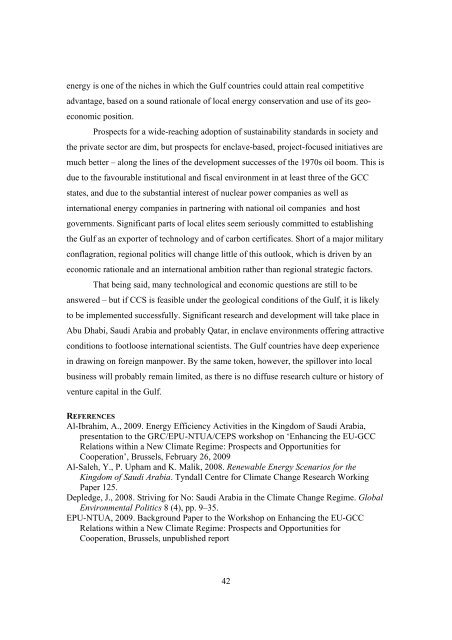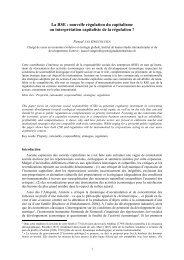PDF - Graduate Institute of International and Development Studies
PDF - Graduate Institute of International and Development Studies
PDF - Graduate Institute of International and Development Studies
You also want an ePaper? Increase the reach of your titles
YUMPU automatically turns print PDFs into web optimized ePapers that Google loves.
energy is one <strong>of</strong> the niches in which the Gulf countries could attain real competitive<br />
advantage, based on a sound rationale <strong>of</strong> local energy conservation <strong>and</strong> use <strong>of</strong> its geoeconomic<br />
position.<br />
Prospects for a wide-reaching adoption <strong>of</strong> sustainability st<strong>and</strong>ards in society <strong>and</strong><br />
the private sector are dim, but prospects for enclave-based, project-focused initiatives are<br />
much better – along the lines <strong>of</strong> the development successes <strong>of</strong> the 1970s oil boom. This is<br />
due to the favourable institutional <strong>and</strong> fiscal environment in at least three <strong>of</strong> the GCC<br />
states, <strong>and</strong> due to the substantial interest <strong>of</strong> nuclear power companies as well as<br />
international energy companies in partnering with national oil companies <strong>and</strong> host<br />
governments. Significant parts <strong>of</strong> local elites seem seriously committed to establishing<br />
the Gulf as an exporter <strong>of</strong> technology <strong>and</strong> <strong>of</strong> carbon certificates. Short <strong>of</strong> a major military<br />
conflagration, regional politics will change little <strong>of</strong> this outlook, which is driven by an<br />
economic rationale <strong>and</strong> an international ambition rather than regional strategic factors.<br />
That being said, many technological <strong>and</strong> economic questions are still to be<br />
answered – but if CCS is feasible under the geological conditions <strong>of</strong> the Gulf, it is likely<br />
to be implemented successfully. Significant research <strong>and</strong> development will take place in<br />
Abu Dhabi, Saudi Arabia <strong>and</strong> probably Qatar, in enclave environments <strong>of</strong>fering attractive<br />
conditions to footloose international scientists. The Gulf countries have deep experience<br />
in drawing on foreign manpower. By the same token, however, the spillover into local<br />
business will probably remain limited, as there is no diffuse research culture or history <strong>of</strong><br />
venture capital in the Gulf.<br />
REFERENCES<br />
Al-Ibrahim, A., 2009. Energy Efficiency Activities in the Kingdom <strong>of</strong> Saudi Arabia,<br />
presentation to the GRC/EPU-NTUA/CEPS workshop on ‘Enhancing the EU-GCC<br />
Relations within a New Climate Regime: Prospects <strong>and</strong> Opportunities for<br />
Cooperation’, Brussels, February 26, 2009<br />
Al-Saleh, Y., P. Upham <strong>and</strong> K. Malik, 2008. Renewable Energy Scenarios for the<br />
Kingdom <strong>of</strong> Saudi Arabia. Tyndall Centre for Climate Change Research Working<br />
Paper 125.<br />
Depledge, J., 2008. Striving for No: Saudi Arabia in the Climate Change Regime. Global<br />
Environmental Politics 8 (4), pp. 9–35.<br />
EPU-NTUA, 2009. Background Paper to the Workshop on Enhancing the EU-GCC<br />
Relations within a New Climate Regime: Prospects <strong>and</strong> Opportunities for<br />
Cooperation, Brussels, unpublished report<br />
42




